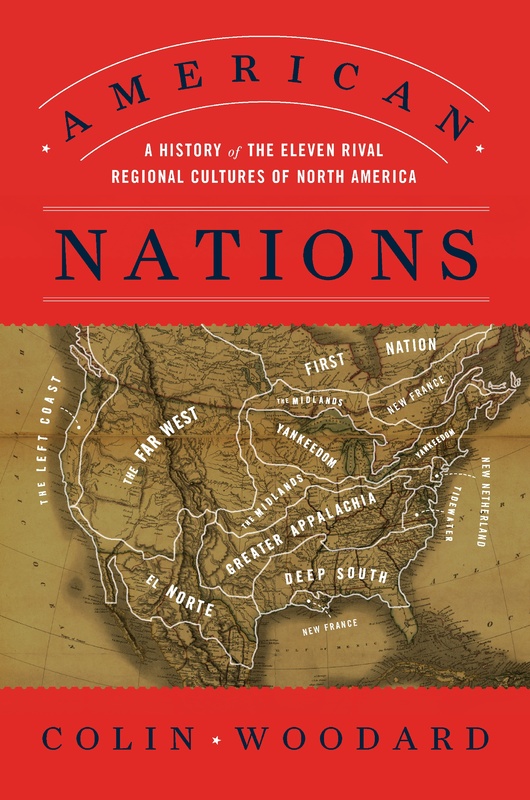Colin Woodard began work on his latest book in the aftermath of the Obama election in 2008. The country was electric with talk of hope and unity. We seemed imbued by a sense of coming together politically and culturally. We would overcome our differences and become the great nation we all knew was within our capacity.
So much for that idea.
Woodard, a Maine writer whose political and cultural observations are read by a national audience, explores the fractures, fissures and rivalries that have divided the country since before we were a country in his new book, “American Nations: A History of the Eleven Rival Regional Cultures of North America.”
The book is receiving a huge amount of publicity. Woodard, who lives in Portland, is making all the talk-show rounds. He is doing interviews with major newspapers across the country, and is garnering reviews from all the important publications. Publishers Weekly named “American Nations” a top 10 pick for fall reading.
At a point when political and cultural divisions seems to have stopped the country in its tracks, Woodard’s book could not be more timely.
The author can’t help but laugh at his luck. “This is a fortunate coincidence,” he said. “When I started this, all we heard about was hope and unity.”
In his book, Woodard traces the history of a fractured continent, dividing it into 11 regional cultures. Just as the original American colonies were settled by people from Britain, France, Spain and the Netherlands — each with unique religious, political and enthnographic characteristics — we remain a country full of intra-national differences and myriad identities, he writes. Those differences have derailed the country and created as much friction now than at any time since the Civil War.
Q: Let’s start simply and at the beginning: What interested you in the topic?
A: I was a history major as an undergraduate, and concentrated on Eastern Europe. I was an exchange student over there, and I began my career as a journalist in Eastern Europe covering the Balkans. That is a part of the world where history casts a long cultural shadow. For better or worse, people over there know their history. But in our country and our continent, we are rather amnesiac about history. We forget a lot of it, and what we do remember, we tend to get wrong.
In the 1990s, I started living in different parts of the United States. I was born and raised in Maine, but living in other parts of the country led me to realize just how profound the regional differences are in our own continent on almost every level, down to the basic understanding of what American ideals and values really are.
Q: Our cultural differences predate the founding of our nation. Should we be surprised they still exist today?
A: We have to remember that the original colonies were founded by separate countries, from distinct regions of Britain, France, the Netherlands and Spain. They were Puritans, the Dutch and the lesser sons of English gentry, and so forth. So it should be of no surprise that we don’t share a common vocabulary about freedom and ideals and what our country is all about. We don’t understand that we are in a sense Balkanized.
Q: In the context of the current political climate, why do our rival regional cultures matter now more than ever?
A: They’ve always mattered, and the polarization and differences between them have ebbed and flowed in the level of tension that they produce. Certainly back during the Civil War, we were in much worse circumstance than we are today. Back then, we fought a civil war over our differences. But our regional values are putting the nation in crisis. We have a stalemate, and the country is almost deadlocked because of the balance of power between the nations is so tight and lately has become so polarized that the concept of compromising has been pulled off the table.
That’s a problem. In the end, our country, our federation, was founded on a grand compromise between nations or cultures. We’re now in a crisis because we have reached a point where there is a refusal to compromise on what various camps believe are core American values.
Q: Do we have any common cultural values in this country?
A: As a federation? That is a tricky question. We certainly think we do. And there will be overlap and maybe even a majority consensus among enough of these nations to say there is a dominant cultural paradigm. There may be issues on which four, five or six nations might comprise a majority or super-majority, but certainly not all agree.
I think we all agree on some level that democracy and freedom are important, but we disagree on what those terms mean. Does that mean we maximize the freedom of individuals or maximize the freedom of community?
Staff Writer Bob Keyes can be contacted at 791-6457 or at:
bkeyes@pressherald.com
Twitter: pphkeyes
Copy the Story LinkSend questions/comments to the editors.




Success. Please wait for the page to reload. If the page does not reload within 5 seconds, please refresh the page.
Enter your email and password to access comments.
Hi, to comment on stories you must . This profile is in addition to your subscription and website login.
Already have a commenting profile? .
Invalid username/password.
Please check your email to confirm and complete your registration.
Only subscribers are eligible to post comments. Please subscribe or login first for digital access. Here’s why.
Use the form below to reset your password. When you've submitted your account email, we will send an email with a reset code.